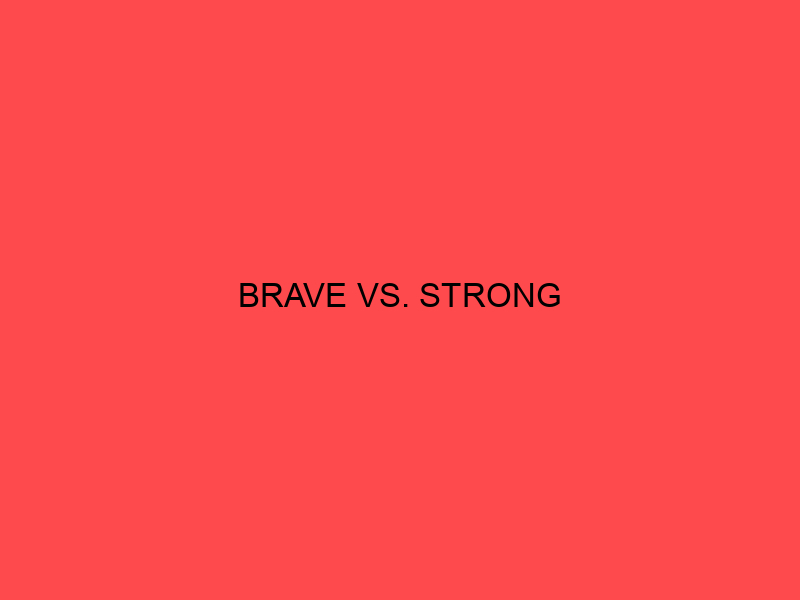-
Brave (adjective)
Strong in the face of fear; courageous.
“bold|daring|doughty|orped|resilient|stalwart”
“cowardly|fearful|mean|weak”
-
Brave (adjective)
Having any sort of superiority or excellence.
-
Brave (adjective)
Making a fine show or display.
-
Brave (noun)
A Native American warrior.
-
Brave (noun)
A man daring beyond discretion; a bully.
-
Brave (noun)
A challenge; a defiance; bravado.
-
Brave (verb)
To encounter with courage and fortitude, to defy, to provoke.
“After braving tricks on the high-dive, he braved a jump off the first diving platform.”
-
Brave (verb)
To adorn; to make fine or showy.
-
Strong (adjective)
Capable of producing great physical force.
“a big strong man; Jake was tall and strong”
-
Strong (adjective)
Capable of withstanding great physical force.
“a strong foundation; good strong shoes”
-
Strong (adjective)
Having a lot of power.
“The man was nearly drowned after a strong undercurrent swept him out to sea.”
-
Strong (adjective)
Determined; unyielding.
“He is strong in the face of adversity.”
-
Strong (adjective)
Highly stimulating to the senses.
“a strong light; a strong taste”
-
Strong (adjective)
Having an offensive or intense odor or flavor.
“a strong smell”
-
Strong (adjective)
Having a high concentration of an essential or active ingredient.
“a strong cup of coffee; a strong medicine”
-
Strong (adjective)
Having a high alcoholic content.
“a strong drink”
“She gets up, and pours herself a strong one. – Eagles, Lying Eyes”
-
Strong (adjective)
Inflecting in a different manner than the one called weak, such as Germanic verbs which change vowels.
“a strong verb”
-
Strong (adjective)
That completely ionizes into anions and cations in a solution.
“a strong acid;”
“a strong base”
-
Strong (adjective)
Not easily subdued or taken.
“a strong position”
-
Strong (adjective)
Impressive, good.
“You’re working with troubled youth in your off time? That’s strong!”
-
Strong (adjective)
Having a specified number of people or units.
“The enemy’s army force was five thousand strong.”
-
Strong (adjective)
very bad or intense
-
Strong (adjective)
Having a wide range of logical consequences; widely applicable. (Often contrasted with a weak statement which it implies.)
-
Strong (adjective)
Convincing.
-
Strong (adverb)
In a strong manner.
-
Strong (adjective)
having the power to move heavy weights or perform other physically demanding tasks
“she cut through the water with her strong arms”
-
Strong (adjective)
able to perform a specified action well and powerfully
“he was not a strong swimmer”
-
Strong (adjective)
exerting great force
“a strong current”
-
Strong (adjective)
powerful and difficult to resist or defeat
“the competition was too strong”
“a strong leader”
“the company was in a strong position to negotiate a deal”
-
Strong (adjective)
(of an argument or case) likely to succeed because of sound reasoning or convincing evidence
“there is a strong argument for decentralization”
-
Strong (adjective)
powerfully affecting the mind, senses, or emotions
“his imagery made a strong impression on the critics”
-
Strong (adjective)
(of language or actions) forceful and extreme, especially excessively or unacceptably so
“the government were urged to take strong measures against the perpetrators of violence”
“a play full of strong language”
-
Strong (adjective)
able to withstand force, pressure, or wear
“cotton is strong, hard-wearing, and easy to handle”
-
Strong (adjective)
not easily affected by disease or hardship
“despite his strong constitution, constant worry and exposure to the elements had worn him down”
-
Strong (adjective)
not easily disturbed, upset, or affected
“driving on these motorways requires strong nerves”
“only a strong will enabled him to survive”
-
Strong (adjective)
firmly held or established
“they had established a strong and trusting relationship”
“he was a man of strong, though unconventional, religious beliefs”
-
Strong (adjective)
(of a market) having steadily high or rising prices.
-
Strong (adjective)
very intense
“a strong smell”
-
Strong (adjective)
(of something seen or heard) not soft or muted; clear or prominent
“she should wear strong colours”
-
Strong (adjective)
(of food or its flavour) distinctive and pungent
“strong cheese”
-
Strong (adjective)
(of a solution or drink) containing a large proportion of a particular substance; concentrated
“a cup of strong coffee”
“strong lager”
-
Strong (adjective)
(of an acid or base) fully ionized into cations and anions in solution; having (respectively) a very low or a very high pH.
-
Strong (adjective)
used after a number to indicate the size of a group
“a hostile crowd several thousands strong”
-
Strong (adjective)
denoting a class of verbs in Germanic languages that form the past tense and past participle by a change of vowel within the stem rather than by addition of a suffix (e.g. swim, swam, swum).
-
Strong (adjective)
relating to or denoting the strongest of the known kinds of force between particles, which acts between nucleons and other hadrons when closer than about 10⁻¹³ cm (so binding protons in a nucleus despite the repulsion due to their charge), and which conserves strangeness, parity, and isospin.

